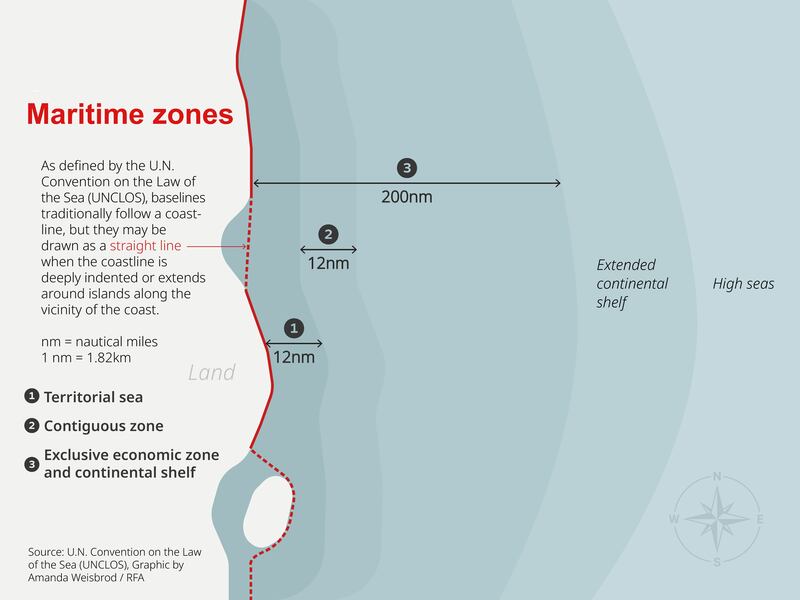Updated July 2, 2024, 9:24 ET
The Philippines says it is willing to hold talks with Vietnam after it called for consultations on a Philippine submission on an extended continental shelf claim in the South China Sea.
“We are ready to engage Vietnam on possible ways forward that would help achieve a mutually beneficial solution to South China Sea issues in accordance with international law, particularly the U.N. Convention on the Law of the Sea [UNCLOS],” the Philippine Department of Foreign Affairs said in a statement.
The Philippines also welcomed Vietnam’s recognition of the submission, filed on June 14 with the U.N. Commission on the Limits of the Continental Shelf, or CLCS, to register the Philippines’ entitlement to an extended continental shelf in the West Palawan region of the South China Sea.
On June 20, responding to Manila’s submission, Hanoi did not protest outright but instead said that while coastal states had the right to determine their outer continental shelf boundaries under UNCLOS, when submitting their claims “they must respect the legal and legitimate rights and interests of other relevant coastal nations with opposite or adjacent coasts.”
A spokesperson for Vietnam said it stayed ready to hold talks with the Philippines to seek a solution that was mutually beneficial for both countries.
Meanwhile, China has rejected the Philippine submission, saying it infringed upon China’s sovereign rights and jurisdiction and violated international law.
Beijing says it holds “historic rights” over most of the South China Sea but an arbitral tribunal under UNCLOS in 2016 rejected all of its claims. The Philippine submission, reinforcing the tribunal ruling, has not named China as a party for negotiations on the continental shelf.

China and the Philippines have recently been involved in tense confrontations over some reefs that both claim but lie within Philippine waters in the South China Sea.
Malaysia also “categorically rejects” the Philippines’ submission on the basis that the Philippines’ continental margin is projected from the baselines of the Malaysian state of Sabah.
“This clearly disregards Malaysia’s indisputable sovereignty over the state of Sabah,” said a statement issued by the Permanent Mission of Malaysia to the U.N.
Acceptable solution
Nguyen Hong Thao, professor of international law at the Diplomatic Academy of Vietnam, or DAV, noted Manila’s willingness to discuss the delimitation of maritime boundaries with the relevant countries.
“Vietnam and the Philippines have been maintaining solidarity and cooperation for the common good,” he told RFA.
It is unclear when the consultation is expected to begin.
The CLCS said it would look at the Philippine submission in a session between January and March next year.
The extended continental shelf is the stretch of seabed that extends to a maximum of 350 nautical miles (648 km) from the shore of a coastal state, which has exclusive rights to explore it or exploit its natural resources.
Related stories
[ US official on Vietnam visit warns of ‘irresponsible’ ChinaOpens in new window ]
[ Philippines ‘monitoring’ Vietnam’s South China Sea island buildingOpens in new window ]
[ South China Sea dispatch: Excitement, fear fill Scarborough Shoal voyageOpens in new window ]
However, the Philippine submission may overlap with previous submissions by Vietnam and Malaysia, as well as with a Vietnam-Malaysia joint submission in 2009, against which the Philippines protested.
In a recent opinion piece, DAV's Thao argued that maritime limits, including the overlapping outer limits of the continental shelf in the South China Sea, need to be agreed upon by the countries involved.
He warned of a new “battle of note verbales,” or diplomatic notes sent to the U.N. secretary-general to express concern, from neighbors of the Philippines.
The CLCS cannot make a determination if another party objects, and that is why in the immediate future, “the Philippines may consider withdrawing from its objection to the Vietnam-Malaysia joint submission and negotiating with these two countries to find an acceptable solution,” the legal expert suggested.
Edited by Mike Firn and Matt Reed.
This story has been updated from statements made by the Philippine Department of Foreign Affairs and the Permanent Mission of Malaysia to the U.N.

